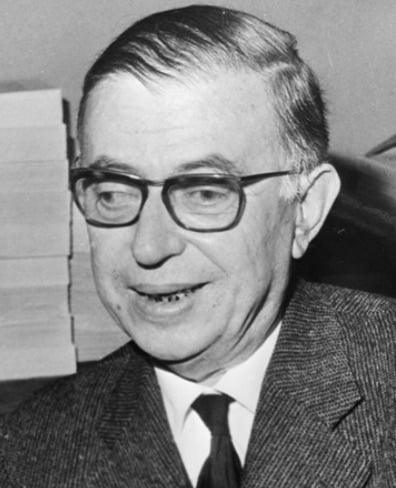
Jean-Paul Sartre was born on June 21, 1905 in Paris as the only child of Jean-Baptiste Sartre, an officer in the French Navy, and Anne-Marie Schweitzer. When he was two years old, his father died and his mother moved to her parents’ house in Meudon, where she raised Sartre with help from her father who taught Sartre mathematics and introduced him to classical literature. When Jean-Paul was twelve, his mother remarried, and the family moved to La Rochelle. Jean-Paul was blind in his right eye causing it to become exotropic, and rendering him the object of bullies at school.
In spite of the social challenges he faced, Jean-Paul achieved high enough grades to gain entry into the prestigious École Normale Supérieure that the famous mathematician, Évariste Galois had attended exactly 100 years earlier. In 1928 he received his MA in philosophy. During the following decade, he taught at a variety of high schools (lycées) and when World War II erupted, he was drafted into the French army where he served as a meteorologist.
When the Germans invaded France, Sartre was taken prisoner, and was confined in a prison camp for 9 months. When he was released in 1941 he, along with several others, founded the underground group Socialisme et Liberté and on one occasion proposed that they might assassinate those who collaborated with the Nazis.
Jean-Paul Sartre is mainly remembered as one of the founders of existentialism–a philosophical movement that rejects the idea that life has purpose and asserts that meaning in life is created by an individual’s choices rather than external factors. He once asserted, “Life has no meaning once you lose the illusion that life is eternal. “His book, Being and Nothingness, published in 1943, examines the nature of consciousness and the relationship between the individual and the world.
In addition to his philosophical works, Sartre also wrote essays, plays, and novels, in which he embedded many of his philosophical ideas. In October 1964, he was awarded the Nobel Prize in Literature but declined it in order to show no partiality toward either the Eastern or Western ideologies by accepting an award from a prestigious Western institution. During the last years of his life, Sartre was taking amphetamines and smoking heavily to enable him to complete his works. Perhaps as a consequence of this health abuse, he died in Paris on April 15, 1980 from pulmonary edema.
One of Sartre’s most famous quotes that captures the essence of his philosophy is, “To be is to do.” Some wag conflated this assertion with two other quotes to generate the following pattern:
To be is to do. —Sartre
To do is to be. — Nietzsche
Do-be-do-be-do. —Sinatra
